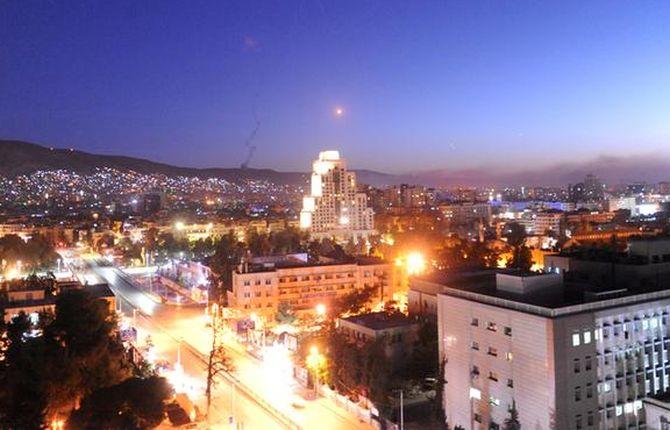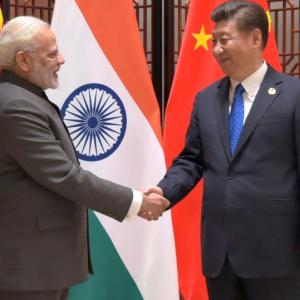'The most striking thing about the US strike on Syria is its futility of purpose beyond a symbolic value to impress the domestic constituency that Trump is a forceful decision-maker,' says Ambassador M K Bhadrakumar.

IMAGE: A missile is seen crossing over Damascus, April 14, 2018. Photograph: SANA/Handout via Reuters
US President Donald J Trump's mind took a fourth U-turn in almost as many days on Friday since he began speaking about his decision to withdraw the American forces from Syria and leave it to 'others' to handle the endgame in the conflict.
He swung to the extreme threatening a rain of missiles on Syria, only to back-track a day later to hint there might not be any attack at all, and finally to announce a joint US-UK-France attack on Friday.
If former US deputy secretary of state Nicholas Burns, an experienced career diplomat, got the impression that POTUS was playing a video game, it comes as no surprise.
Indeed, the most striking thing about the US strike on Syria is its futility of purpose beyond a symbolic value to impress the domestic constituency that POTUS is a forceful decision-maker, who unlike his predecessor Barack Obama, lays down 'red lines' and follows up.
Actually, it is a cowardly stance.
Trump hastened to strike just hours before the investigation by the team from the Organisation for the Prohibition of Chemical Weapons was due to begin in Douma -- as if time was running out to act with impunity.
Clearly, Trump felt the compulsion to be seen acting.
He had no authorisation from the United States Congress nor did he secure a mandate from the UN Security Council to launch aggression against a UN member country.
The indignation and outrage in the statement by UN Secretary-General Antonio Guterres will be widely shared by the world community: 'There's an obligation, particularly when dealing with matters of peace and security, to act consistently with the Charter of the United Nations and with international law in general. The UN Charter is very clear on these issues.'
'The Security Council has primary responsibility for the maintenance of international peace and security. I call on the members of the Security Council to unite and exercise that responsibility. I urge all Member States to show restraint in these dangerous circumstances and to avoid any acts that could escalate the situation and worsen the suffering of the Syrian people.'
Both the constitutionality of Trump's decision and the legality of the US attack under international law is highly questionable.
However, the extenuating fact is that historically domestic public opinion rallies behind POTUS when the US is at war abroad. For Trump's crumbling presidency, that is an over-riding consideration today.
On the other hand, the attack on Syria was carefully choreographed.
Paris has disclosed that Moscow was informed in advance. Indeed, 'deconfliction' proceedures were under discussion between the Pentagon and the Russian defence ministry for the past 2-3 days.
The attack clinically targeted alleged chemical weapon sites in three cities in Syria -- Damascus, Hom and Hama.
No military bases or assets were attacked.
The missiles scrupulously avoided locations where there could be Russian personnel.
Care was taken to avoid 'collateral damage'. In fact, there has been no reported casualty. On the whole, it is as if a riveting fireworks show has been conducted.
The Syrians claim they shot down a fair number of incoming missiles. But like in the Sherlock Holmes story, the dog didn't bark -- not a single move has been reported by Russia to intercept the incoming missiles.
Moscow simply watched a brawl unfold between the US, UK and France on one side and the Syrian regime on the other.
Moscow instead turned on its propaganda apparatus to take the maximum advantage of the senseless, almost bizarre missile attack.
If the OPCW team turns in a 'Nil' report from Douma shortly, Russian propaganda can be trusted to go for Trump's jugular veins.
The US attack will not create any new facts on the ground. The comprehensive victory of President Bashar al-Assad's Syrian regime in the 7-year conflict is becoming an irreversible reality.
Arguably, this could be the last waltz of the Western interventionist powers in Syria who had hoped to overthrow the regime and failed miserably.
In sum, in the absence of a coherent US strategy toward Syria, this latest attack may only stoke the fires of Syrian nationalism.
Russia has spoken of 'serious consequences', without elaborating.
Will Russia escalate the situation? Seems unlikely. It is hard to see a Russian reaction on the ground although Moscow is watchful that the Western strategy ultimately threatens the Russian presence in Syria.
Much depends on the next Western move. NATO Secretary-General Jens Stoltenberg is expected in Ankara on Monday.
In a strongly worded statement, President Vladimir Putin has warned that the 'escalation in Syria is destructive for the entire system of international relations. History will set things right, and Washington already bears the heavy responsibility for the bloody outrage in Yugoslavia, Iraq and Syria.'
Russia proposes to convene an emergency meeting of the UN Security Council 'to discuss the aggressive actions by the US and its allies,' Putin said.
Of course, new regional alignments will become inevitable. Turkey and Israel have backed the US attack.
The Turks' bazaari instincts are legion and President Recep Erdogan senses a historic opportunity to project Turkish power into Syria and realise his 'neo-Ottoman' dream. Trust him to overreach.
Israel is a bit down in the mouth for the moment due to the messy confrontation at the Gaza border; or else, it would have jumped into the fray.
Israel's best bet will be that the US keeps an open-ended military presence in a Syria that is balkanized and weak and is in no position to reclaim the lost territory in the Golan Heights that are under Israeli occupation since 1967.
All eyes are on Iran. But Tehran will not speak its mind.
For the moment, Tehran's eyes are cast on the May 12 deadline when Trump must decide on the sanctions waiver to the July 2015 nuclear deal.
The big question now is whether Trump would tear up the Iran nuclear deal in the present circumstances when the US needs the support of its European allies.
Syria constitutes Iran's defence line. Significantly, even as Trump was ratcheting up rhetoric against Syria, the powerful Iranian statesman Ali Akbar Velayati, advisor to Supreme Leader Ali Khamenei, landed in Damascus on Wednesday, met President Assad and toured Douma, the alleged site of the chemical attack.
It was a defiant gesture and act of solidarity with Assad.
Tehran has hinted at 'regional consequences.' But Iran's style will be to avoid direct conflict with the US and opt instead to intensify its political work and consolidate its wide networking with various groups on the ground, which systematically keep undermining the US presence in Syria and Iraq.
No doubt, Iran will intensify the politics of 'resistance' against Israel.
The Russia-Iran partnership in Syria is steadily morphing into an alliance, which is in mutual interests.
The defeat of the US-Israeli-Saudi containment strategy against Iran may turn out to be the most significant and enduring outcome of this US attack on Syria.










